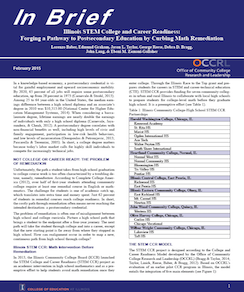In an increasingly globalized, knowledge-based economy, there are strong economic and social implications for the need to improve postsecondary degree attainment for all student groups. Socially, postsecondary credential attainment correlates with civic engagement, health, and wellness (Oreopoulos & Petronijevic, 2013; Pascarella & Terenzini, 2005). Economically, it is projected that in the next five years, 65 percent of all jobs will require some education beyond the high school diploma (Carnevale & Strohl, 2013). This increase in jobs requiring postsecondary credentials coupled with global competition has led to national completion agendas that aim to increase the number of Americans with postsecondary credentials. In order to help meet the nation’s goals, we must first work to improve access to and within postsecondary education for all student groups. Although there are myriad places to begin, this blog focuses on college and career readiness. It is estimated that nearly 60 percent of community college students require at least one remedial course (NCES, 2013). Of the 60 percent that do require remedial coursework, only two-thirds actually complete the remedial coursework.
OCCRL’s forthcoming In Brief focuses on Illinois’ efforts to reduce the need for remediation in college, and highlights promising practices from the STEM College and Career Readiness (STEM CCR) initiative. Through STEM CCR, seven community college sites, along with their high school partners, have worked to implement CCR programs that address academic and college knowledge gaps. The STEM CCR initiative, funded by Illinois’ Race to the Top grant, is now in its third and final year, and we are beginning to identify important successes and best practices. We are finding that partnership alignment, with a consistent shared vision, proves to be beneficial for implementing CCR programs. Sites that are strategic in developing their partnerships, working to align efforts related to the dimensions of the STEM CCR model, and being collaborative across the secondary and postsecondary spectrum, are finding success in their implementation. In addition to strong partnership alignment, what best practices are used on your campus to improve college and career readiness?
Edmund Graham III, M.Ed., is a doctoral student in Education Policy, Organization and Leadership with a specialization in Higher Education at the University of Illinois at Urbana-Champaign and currently works as a Graduate Research Assistant for OCCRL.
